Purple People Readers
The booklikes version of my book blog, so if you only want to read about the stuff I post on books, here it is!
Book Review: Cork Dork by Bianca Bosker

*I received a free copy of this book from the publisher in exchange for an honest review through NetGalley.*
My husband and I started learning more about wine when we first read The Judgment of Paris by George M. Taber. Once we started earning money from having jobs (rather than being rather poor full-time students), wine became a favorite drink of ours to start off and end our weekends. We were fascinated with the history of winemaking and the culture that surrounds it. We’ve lately taken our drinking a step further and joined a wine club where we very rarely drink the same bottle twice — we love trying new wines, seeing what they pair with, and comparing them to other wines we’ve had. So, when I saw Cork Dork available on Netgalley, it seemed like the perfect fit.
Bosker’s experience as a journalist shines through her ability to bring the reader exactly where she is and fully delve into the context of the situation. She not only covers the basics of what it means to be a sommelier, but explains at length the science behind tasting and smelling, ways to improve those senses, the aspects of serving wine in fine-dining restaurants, the sommelier exams, the tastings, etc. Everything is explained in detail and I both learned a lot and was thoroughly entertained. She goes through these experiences while also describing the people she meets along the way, their lifestyle and interests, and how they came to be a part of the community they’re involved in.
My favorite part of this book, however, is how much I learned about wine. Bosker offers great tips for ordering wine at restaurants (ASK THE SOMMELIER!), and also shares what she learns about improving your taste and smell capabilities. I admit, I’m also incredibly interested in the subject itself, so I’m a bit biased, but I totally bought in to a lot of the things she offered as advice. I told my husband that the book explains that we’re not often explicitly taught how to identify smells the way we can identify color and sights, so Bosker recommends smelling different things over and over again so that you develop a memory for it — and now we both are working on improving our sense of smell by smelling spices and foods and trying to imprint them on our memories. And you know what — being more conscious of smells and tastes truly does heighten the experience of drinking a beverage or eating a food. Who knew?
Despite the fact that this book holds A LOT of information about wine and dining, it’s still a fun, entertaining read. It’s part memoir, part informational book, interweaving it all together so that it flows as a cohesive story. Bosker makes it super easy to get into — she starts with the basics and builds her way up. It’s great that she started as a person who knew almost nothing about this subject before starting, because she’s able to reach out to people who know basically nothing themselves. I admit, I didn’t know much about wine before this besides the fact that it’s grown in different places and can be paired with meals and is sometimes fruity or earthy. Now, I feel like I have such a better handle on the idea of wine and food pairings, and how wine is made and served, etc. And I was able to laugh and enjoy a good story while learning more about it. It’s really the perfect book.
If you’re at all interested in wine or even just the history and community surrounding wine, I would highly recommend this book. It’s one of my favorite non-fictions I’ve read in a while, and I will most definitely buying copies of this to gift it to friends and family. So worth it!
 2
2
Manga Review: Angel Sanctuary Vol 1

Killer computer games, reincarnation, fallen angels, demons, weird romance — this book has it all! Seriously, I don’t think that it can get any cooler. Sometimes, when a bunch of really cool elements are thrown together in one book it can be disastrous, but Yuki pulls it off and has created an incredibly exciting, suspenseful series. Plus, the artwork is beautiful. I don’t think I’ve ever read a manga with such gorgeous drawings.
As for the characters, I fell in love with Setsuna immediately, and I adore all the others. It’s a very complex story with a deep historical background that I’m sure will be revealed little by little throughout the series. There are some funny moments to alleviate some of the tension (this is a very dark series). These moments aren’t laugh-out-loud funny, but they definitely put a smile on my face.
The only thing I had trouble with was remembering who was who, and what gender they were — Yuki seems to love the theme of too-pretty males.
I would recommend this for fans of dark fantasy and fallen angels. Be prepared for some serious weirdness, though!
 2
2
Book Review: Industrial Magic by Kelley Armstrong

While I am usually very strict about only reading series in order, for some reason, I’ve skipped around in this one a lot. Maybe because different books are from different perspectives? Anyway, I picked this up after being away from this series for a while, so it took me a bit to figure out exactly where I was in each character’s storylines. Having already read sequels, I must say it was way too much fun meeting Jaime the necromancer for the first time. Her first impression is as ridiculous and wonderful as I wanted it.
This book is a fun mystery/thriller with supernatural aspects involved, and of course, it includes all of our favorite characters from the Otherworld series; I love that the werewolves make an appearance in this novel. (Since the series started with Elena, I have a feeling that she and Clay will always be my ultimate favorites.) But I really would recommend this book for thriller lovers, I kept referring to it as the “supernatural serial killer” novel I was reading, and it fits so perfectly. Basically, Paige and Lucas agree to help the Cabals (supernatural mafia-like groups) to help find the person who’s been killing teenagers of Cabal employees. It follows the typical thriller-style of stories where they think they have the whole thing solved, but it turns out that they were missing a couple pieces of the puzzle, which makes for an interesting, surprising read.
The serial killer stuff was great, but my favorite development for the series as a whole was getting to see Paige and Lucas’s relationship develop. They’re finally talking about the important things and finally start admitting that things are serious with each other, which creates for some fun situations and some hilarious conversations/jokes about how they’d run their own Cabal if they were really able to be in charge.
Overall, it’s a solid addition to the series, which I really do believe is a must-read for supernatural fans (the genre, not necessarily the show). I love that while we were introduced to a new character or two, for the most part, this novel just worked on developing the relationships between characters we already know. Genuinely enjoyed every minute of reading this.
Book Review: The Briar King by Greg Keyes
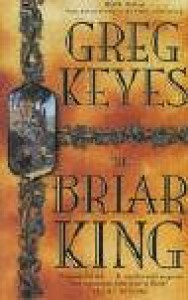
The storyline of The Briar King is fantastic. I enjoy fantasy plots with a doomsday prophecy and characters who have no idea what they’re getting themselves into. There are the stereotypes that one comes to expect in this sort of novel: stubborn, hot-headed princess, naive priest, brave knight, cynical woodsman, etc. However, I think there are quite a lot of unique elements to the story, and the imagery of the Briar King thoroughly creeped me out. What really sold me at the end was how everyone’s stories start fitting together.
Despite this, I found this book extremely difficult to get in to. The writing gets progressively better throughout the book, but the beginning was tough going. It reads like a middle-grade novel instead of adult fantasy. There’s very simplistic narrative, unrealistic dialogue (and a lot of it!), and many of the characters aren’t likeable at first. At about three-quarters of the way in, the plot gets moving and the characters get better. I think it’s because they have to deal with real problems instead of whining about trivial things.
I’m not sure if it’s worth investing in this series yet, considering that it doesn’t become good until the later part of the first book. There are three more books, and if these three are anything like the last part of The Briar King, I think it will be worth it. The ending of this book is definitely enough to keep me reading more, but the sequel has to be very good for me to continue with this series all the way.
Book Review: Masque of the Red Death by Bethany Griffin

This was a huge hype book when it came out, so I was excited to (finally) pick up a copy and read it. I enjoy Edgar Allan Poe’s short story that this is loosely based upon and was interested to see what sort of world Griffin would create around that idea — especially one that would hold up for an entire novel and its sequel.
Masque of the Red Death is basically a post-apocalyptic dystopia rather loosely set in Victorian times, with some steampunk elements to it; for example, Araby and her friend April ride in steam-powered carriages, created because horses died from the plague that killed off most of the population in the city. While Poe’s short story focused on the Prince Prospero’s parties and how he locked everyone up to escape the plague, this story mostly focuses on outside Prince Prospero’s castle and what’s happening while he hides from the city’s problems. We get to briefly meet him and hear about him because April is his niece and Araby is the daughter of the scientist who invented a mask filtration system that allows the rich to go outside and survive.
Overall, I found this a quick, fun read. I was worried we were going to get into mushy romance territory at the beginning, but Araby’s romantic inclinations are actually well handled and further the tension and plot of the novel, which I very much appreciated. The characters are great — we get the superficial stuff at the beginning, but then things are revealed throughout the story to slowly reveal complex, interesting characters. Though this is kind of true for the main character, this is mostly true for the side characters and reflects Araby’s knowledge/impressions of them; for example, she thinks her mom is vapid and too nervous, but then we find out that there might be a good reason for that.
While this was a fast read for me, a lot of it didn’t feel particularly interesting. I think a bit too much time was set up on fleshing out just how depressing life and the city is post-plague, and while it’s important, I’m not sure that we needed to so much of the fluff and could have gone into more interesting developments. Although, I do understand that we learn along with Araby because she’s been fairly sheltered up to where we meet her in the book, I just felt like there wasn’t quite enough substance to hang onto, and what substance I was given was super interesting, so I wish there were more.
Again, I found this book fairly entertaining, but didn’t see much in it to be able to rave about it. It’s a solid story with fairly interesting characters, even if the main character is a bit too naive for my liking. It falls into the same basic tropes most young adult novels of this time did: love triangle, corrupt government, and rebelling factions. I’m still interested to see how the sequel brings some of the bits and pieces together, but this isn’t something I’m going to go out of my way to recommend to people. It’s fine if you like this sort of thing, and certainly enjoyable, but not a must-read.
 4
4
Audiobook Review: The Devil Wears Prada by Lauren Weisberger
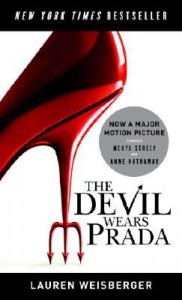
I saw the movie before I read the book, so of course I compared the two throughout my whole time listening to The Devil Wears Prada.
The book is quite different from the movie, which I loved. I know that book-lovers hate it when their favorite book gets a make-over when turned to film, but my experience was backwards. Reading a book after watching a faithful movie representation bothers me a little. I feel like it’s a waste of time, because I already know the characters and what happens. In this novel, the premise and most of the plot are the same, but the characters are distinctly different. The story isn’t as light-hearted as the movie, which I found to be the most striking difference. Miranda isn’t humanized at all, Emily is less mean (and therefore less funny), but she’s definitely a more interesting, complex character than what the movie shows, and there’s a lot more going on with Andrea’s friends and family in the novel.
Obviously, there are events the movie cut out due to time constraint and flow. These were fun to hear about and gave a much clearer picture on what Andrea was dealing with not only in regards to her job, but with her family and friends as well.
I’m really glad I listened to this on audiobook. The narrator, Bernadette Dunne, makes the characters come alive. I got a good feel for their personalities and I could picture them a lot better than I would have been able to if I had just simply read this novel.
Overall, The Devil Wears Prada is entertaining and funny. I also like that it has a good message, but I wasn’t beaten over the head with it. I would definitely recommend this, even to those who have seen the movie. Just be prepared for it to be different.
 3
3
Book Review: Torment by Lauren Kate
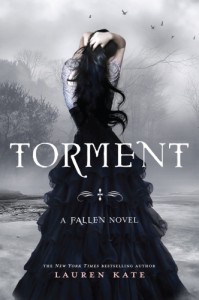
I’m grateful my friends told me to stick with this series, because I definitely liked this book better than Fallen. There was still a lot of teen angst, which I guess you have to expect from a book like this, but the story was more believable, which I appreciated.
With all the stuff that’s going on, Luce is finally becoming a little less whiny and helpless and is taking charge of her own life. Thank goodness! I wanted to see this in the first book, but I’m glad that it came about eventually. One thing I didn’t like about her was that she seems to be a bit stupid at the beginning. I mean, she just went through this huge battle with people trying to kill her, yet she doesn’t listen when Daniel and Cam tell her to stay at the school where she’s safe. This cluelessness on her part is an attempt at conflict, I think, but it just irritated me.
Another thing that bothered me was the tension between Daniel and Luce. Again, I feel it was forced. Daniel using phrases like, “Don’t disobey me!” to Luce doesn’t make any sense to me. He knows her personality and knows how she’d react to that. And why can’t he just explain things? It doesn’t help the suspense at all, because the reader pretty much knows what’s going on and it bothered me a lot.
Despite that, I really did like this book. I liked the new characters we were introduced to, though Miles is a bit annoying. And Shelby is definitely my new favorite. Seeing children of angels and demons and learning what they can do was a highlight. It was also strange to see how popular Luce is in the angel/demon world. Kind of a Harry Potter moment for her.
The story itself was fast-paced and interesting. I kept wanting to know what would happen next and what Luce would figure out about her past that would shed some light on what’s going on in the present. I loved the ending and how it gave enough information to satisfy my curiosity, but not so much that we now know all that’s going on. It answered some questions, and made me ask a few more. I thought the final battle at the end was a little unrealistic — really, nobody saw that? But I can get over it.
If you found yourself on the fence about Fallen, don’t give up on the series! Definitely give Torment a try before you decide not to like it.
 1
1
Book Review: How to Eat Fried Worms by Thomas Rockwell
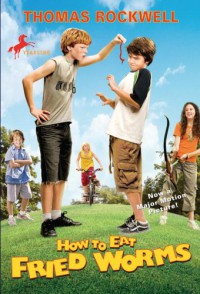
This book was short, sweet, and hilarious! I can just imagine 10-year-old boys making this sort of bet with each other. I admit, the part where he at the worms was kind of gross, but I enjoyed all the ways he tried to make the worm appetizing. It was also funny seeing how the other two try to trick Billy into losing the bet (and there are a couple of good tricks).
I do have to say that this book is somewhat dated. Written in 1973, some of the phrases used and attitudes of the parents/children just don’t fit in with how today is, but it still a great read. When it comes down to it, it’s all about dealing with peer pressure and that will stay relevant forever.
I thought the narration was phenomenal. Sanders really brings the characters and the story to life. However, I’m not a big fan of background music in my audio books, and there was a decent amount in this one. It wasn’t enough to really bother me, but I did find myself wishing they would cut out the music and just let the man tell the story!If you have a couple of hours to spare (whether for reading or listening to an audio book), then go for it and pick this one up. It’s worth it!
 3
3
Book Review: Dead in the Family by Charlaine Harris

Dead in the Family starts off a bit darker than the other novels in the series, but considering what happened in the previous novel, I would have been upset if it didn’t. Sookie has lost a lot of her innocence and naivete, and I think this is a good change from the beginning books of the series. After hanging around the vampires and the weres, something had to happen to make her less soft.
From when I first started reading it until it ended, I couldn’t put this book down. What I love about Harris’s books is that they are so well-constructed and developed. There are a lot of things going on, what with the political business concerning the weres, Alcide’s pack adjusting to the new rules, her relationship with Eric, Eric’s maker coming to visit, and the aftermath of the Faery War. Needless to say, it was packed with conflict and problems. The characters are awesome, as always — Claude was particularly hilarious in this novel, and I’m glad we got to see more of Sookie’s telepathic cousin, Hunter.
This book was a lot calmer than the rest — less tension, less conflict. I didn’t mind it at all, because I feel like this is just the calm before the storm. Victor seems to have it out for Sookie and Eric, something different is happening with Bill’s character (not going to say what due to spoilers!), and the fairy situation is finally starting to wrap up — or so it seems. I think the next few books are going to be very interesting and exciting.
 4
4
Book Review: Console Wars by Blake J. Harris

I came across this book a while ago and, growing up in a hardcore Nintendo family, I was interested in learning the history behind Sega and Nintendo, especially since I was a kid in the 90s and while I don’t quite remember how Sega became a thing, I remember it being novel to me when one of my friends said they had a Genesis rather than an SNES. It’s been sitting on my to-read list for quite a while and my interest in it was renewed when my husband (who’s way more knowledgeable about video games than even I am, and that’s saying something) decided to read it as one of his summer reads. After not too much cajoling by him, I finally picked it up to read it.
Console Wars is interesting, because while it mostly follows Kalisnke, who was the CEO who got Sega to become a household name, it’s not told in any sort of biography or memoir format and mostly heavily focuses on marketing, the partnerships between the different gaming companies, and the games/systems themselves. So, if you’re not interested in the history of video games or how feats of marketing can completely change a company, this book is very much not for you. I studied marketing at university, so reading the different techniques the companies used to get ahead was fascinating. Also, like I said, I come from a hardcore Nintendo family and grew up playing the NES and SNES (if I remember correctly, actually, my family purchased every single system Nintendo came out with), so it was fun to see things from the “competitor’s” side and also read about how Nintendo responded to what was happening.
Overall, this gives a fairly comprehensive look at how Sega and Nintendo originated and also touches on the history of some well-known video gaming companies like Electronic Arts and Namco. I love that the human element is included and we get to learn about who the people are that drove video game innovation, even while so many were saying that it was bound to die. It was a slow read for me, but I very much enjoyed the steady pacing and the sheer volume of information that this book contained.
Book Review: The Arm of the Stone by Victoria Strauss
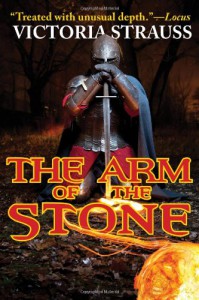
The beginning of The Arm of the Stone was really rocky for me. Honestly, it got to the point where I thought about giving it up; however, I didn’t and I’m glad I stuck with it.
I thought the beginning was rather drawn out and overloaded with characters, history, etc. Also, the conflict didn’t seem very interesting to me: Bron’s family swears to take back the Stone, which was once theirs and reclaim their power from the Guardians who now hold it. I thought this was too simplistic and it didn’t really hold much promise. However, there is a huge turning point in the novel, and that’s when the novel picked up its pace and started to become interesting.
What I love most about The Arm of the Stone is the story and the world. Strauss does an excellent job in making the story seem straightforward, and then she throws a curveball at you, completely changing your perspective of what’s happening. Also, the world is extremely well-constructed. When I read the novel, I was completely immersed because of the level of detail Strauss includes.
Another thing I liked was that I felt that the characters showed a lot of growth. The Bron we meet on page one is completely different than the Bron we know on the last page, which I think is one sign of a successful book. The same goes for many of the characters in the novel, including Liliane and Goldwine, to name a few.
There were times when I got confused about jumps in time and it did take me a long time to finish this novel, because it’s loaded with so much. I don’t think the latter is necessarily a bad thing, but it’s definitely not a quick summer read. It is, however, one of the best fantasies I’ve read in awhile and I’m greatly looking forward to the sequel.
I would recommend this for fantasy fans who enjoy coming-of-age adventures.
Book Review: The Floating Island by Elizabeth Haydon

This book is just downright fun. I picked it up because Elizabeth Haydon writes an AMAZING adult fantasy series (Symphony of Ages, if you want to look into that), and I wanted to see how her middle grade stands up against that. The answer I found: The Lost Journals of Ven Polypheme might actually be better than Symphony of Ages.
The Floating Island centers around a 50-year-old “Nain” (literally french for dwarf — very cool wordplay there) named Ven, who is just reaching his majority by his race’s standards. He is the son of a shipmaker and when he goes to inspect his father’s newest ship, he embarks on what seems to be a never-ending adventure full of twists, surprises, and magic. This feels like an old-fashioned, true adventure story to me, and it’s something I would have DEVOURED when I was twelve — mermaids, dwarves, pirates, kings, intrigue, revenants, magic — this book has everything I love about fantasy, and more. Even as an adult, I enjoyed it immensely. It’s well done in that it’s framed as a “true” story and these journals of Ven were recently discovered and gathered and published by the author. The narrative itself is interesting in that it switches between straight-up journal entries told from Ven’s perspective and regular narration. This definitely allowed the story to strike a balance between being fast-paced while also remaining true to the journal idea. The illustrations by Brett Helquist are great and add a lot to the story in terms of being able to imagine everything and giving credence to the journal idea.
My favorite part is how this story focuses on what it means to have a home, what friendship/family truly means, and how our lives are bettered by being surrounded by kind people. This is very much a coming of age story, and Ven is able to find his bravery in order to save his friends and stand up for what he thinks is right. He learns how to find out the truth and speak for himself, instead of just going along with whatever people tell him. It’s a great lesson for kids, especially as they find themselves growing up and also trying to figure out how to make their own decisions and be their own person. (And probably could help adults like myself be reminded of the important things in life.)
I can’t recommend this enough, I loved every second of reading this book and am very much looking forward to the sequel.
Manga Review: Kimi ni Todoke From Me to You, Vol 1 by Karuho Shiina
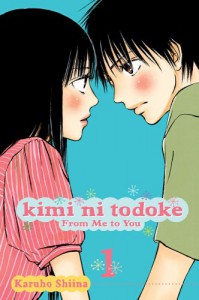
I have never read a manga book before this. It seems surprising, since I watch anime and I’ve always been interested in the stories, but I guess I’ve always thought reading novels would be more satisfying. However, I’m glad I decided to read this one.
It’s such a cute story. I finished this book in about three days, even during finals week. I like how the author takes time to really develop the characters and the story. It’s not a fast-paced romance, where both of the main characters instantly fall for each other and can’t live without each other; rather, it’s more real. It’s obvious that they like each other, but they don’t immediately fall in love. Instead, they talk and hang out and get to know each other.
Despite the fact that this is paced slower than most stories, I still really enjoyed it. It’s very funny — some parts even had me laugh out loud. I am definitely going to read the rest of the series.
All in all, a very good introduction to the manga world.
 2
2
Book Review: The Soldiers of Halla by DJ MacHale

You know what makes a great book? Authors who aren’t afraid to get dirty; authors who don’t hold back on tragedy. This is especially true in adventure books — if your characters are frequently put in dangerous situations, bad things should happen. Yes, maybe they’re able to get out of those bad situations and rise above it, but it shouldn’t be easy for them. D.J. MacHale is one author who definitely doesn’t hold back and definitely doesn’t make it easy for his characters in the final battle.
I am very satisfied with the conclusion of this series. All the characters showed tremendous growth and the final battle was pretty awesome. MacHale did some careful planning with this series, because I noticed things that tied back to clues given in previous books, which was fun. This is the point I was waiting for throughout the entire series, and like I said, MacHale doesn’t hold back. The stakes are high and it gets dangerous for Bobby and his friends.
The only thing I didn’t like was the explanation of what makes them all Travelers and how the gates were formed. I know it’s a fantasy/science fiction novel, but it was just a little too far-fetched for me. I’m not going to go into detail due to spoilers, I’ll just say that I think there could be far better explanations to the one MacHale chose.
However, this was a satisfying ending. It got kind of shaky for me around book 6 (The Rivers of Zadaa), but I continued with it because I was invested in the characters by that point. Around book 8 (The Pilgrims of Rayne), I was feeling it again, and now I’m glad I stuck with it. Soldiers of Halla is a great book full of excitement, danger, adventure, friendship, and everything that I love about the Pendragon series. Honestly, I think it’s the best book of the series because the stakes are raised so high and the characters really have to struggle.
I recommend this entire series to lovers of young adult adventure/fantasy. They’re imaginative, exciting books that don’t disappoint.
 2
2
Book Review: Into Thin Air by Jon Krakauer
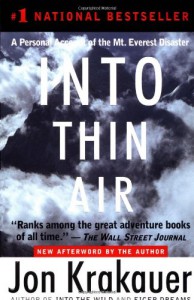
Into Thin Air is both thrilling and terrifying. Not that I was considering it, but I will now never take mountain climbing as a hobby — especially mountains where high-altitude sickness is a problem. Krakauer includes the history of Mount Everest along with the day-to-day events of his expedition, which added an interesting, enjoyable element to the novel. Not only was I reading a great story, I felt like I was learning a lot too.
Into Thin Air is a tragic story that is wonderfully told. The level of detail included in the descriptions is remarkable. I felt like I was climbing Everest with the author, going through the same psychological and physical torture. I also got to know those who climbed with him, sharing in their successes and failures. I want to note that there is a controversy as to whether the events happened like Krakauer said they happened; I am sure, with all that was going on at the time, that there are discrepancies with events, but I doubt that they are serious since he also interviewed multiple people who were there as well.
I would recommend this book for anyone who is at all interested in adventure or memoirs. If you’re squeamish, you should maybe stay away, since there are descriptions of some pretty awful sights and diseases (I got queasy more than a few times). However, I think that Into Thin Air is a novel most people will find a worthwhile read.
Book Review: My Bridges of Hope by Livia Bitton-Jackson
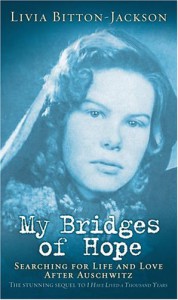
I went into this book not really knowing what to expect — I’m not sure how it ended up on my family’s shelves, but I noticed it one day and added it to my to-read list for the future. Now, I have no idea where my copy of this book is, but luckily, the library had a copy. This is a memoir about a teenage girl’s coming of age after she survives the Holocaust and struggles to make a life for herself and make sense of the world after what she suffered, and after the turmoil that her country is put in post-World War II. It’s written in a very easy-to-read manner, so I can see this being a great introduction to older children and middle-graders as to what different people had to deal with during this time. It’s also a pretty quick read and told in short segments, so it would be easy to include in a Holocaust curriculum, at least in part.
This is apparently book 2 in a series, and I love that it follows the aftermath of the Holocaust, which I don’t think is talked about quite as much — or at least, my teachers never focused on it as much as the Holocaust itself. I’ve never read much about what happened to Slovakia after the war, so I enjoyed this book for giving me that perspective and teaching me more about all the different countries and people who were affected by the Holocaust, and how the surrender of Germany didn’t lead to immediately fixing anti-Semitism. Livia tells her story with painstaking honesty, and it hurt to see how roughly Jewish people were treated even after the war, and how hard it was for them to reunite with family members who had already emigrated to the United States or other countries. For some, it was even impossible.
Overall, I recommend this for someone who’s looking to learn more about this time period and what people had to deal with. In a way, it was heartening to read, because the community came together for each other and all supported one other so that they could make a better life for themselves. It’s still horrifying that any people were ever treated the way Jewish people were treated during this time, but reading about someone overcoming that hate and being an integral part in building up her community was heartwarming.



